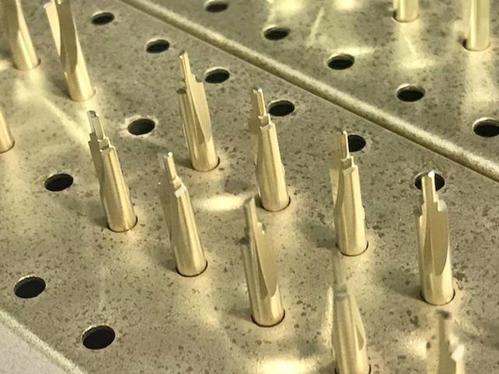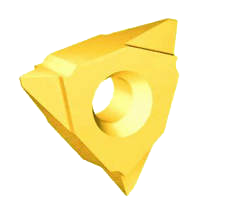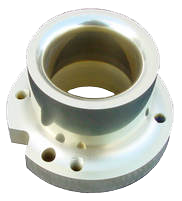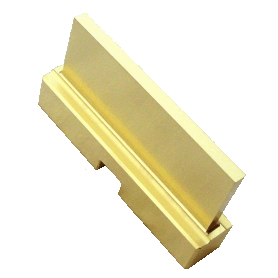Upgrade to Alpha™
Alpha™ coating is an extremely hard, all-purpose, nano-layered coating that contains and has zirconium nitride (ZrN) as the top layer. The bulk coating is much harder than its individual components. This synergy results in exceptional abrasion resistance and lubricity.
The extreme hardness of Alpha™ coating (4200 – 4600 Hv) and the lubricity provided by ZrN, enable Alpha™ to outperform other coatings in a wide variety of applications, especially punching, forming and cutting tools.
Alpha™ will typically last two to four times longer than TiN and ZrN due to its superior hardness, abrasion resistance and lubricity.
We offer zirconium nitride (ZrN) as an option to Alpha™ based on certain limitations.

Alpha™ Coated Cutting Tools
Case History #1
- Alpha™ Coated Thread Whirling Inserts (Carbide, 3/set)
- Workpiece: 316L SS & Ti-6Al-4V
- Results: Uncoated: 10 Parts
Coated: 500-1000 Parts
Life: 50 – 100X - Coating Cost – $2.25 per insert
- Payback – > 100 x

Case History #2
Alpha™ Coated Form Tool
- Before Coating – Polishing Draw Die every 400 hits due to galling and metal buildup
- After Coating with Alpha™ – 100,000+ hits, with no die polishing.
- Night and Day Difference

Properties
Thickness: .0001″ – .0002″ (2 to 5 microns) on the working surfaces.
- There is some variation in coating thickness across tool surfaces. Edges collect more vapor, so they get more coating.
- Factors such as process parameters, tool geometry, tool location inside the vacuum chamber, etc., can all influence how thick the coating is on a particular area of the tool.
- It is possible to build up coating thickness by coating a part multiple times. As the coating gets thicker, there is a greater chance of spalling.
Hardness: 4200 – 4600 Hv (>80 Rc).
- Alpha™ is one of the hardest coatings we offer, being about the same hardness as TiCN.
- This Vickers Hardness correlates to a hardness much greater than 80 Rc. (Rockwell C is not used above 80 Rc (1850 Hv)).
- Harder than Carbide and straight ZrN (2500-2800 Hv).
- Due to the added hardness and lubricity, Alpha™ usually lasts 2 – 4 times longer than TiN and ZrN in most applications.
Inert and Stable – Alpha™ coating does not react with most materials and doesn’t begin to oxidize until about 850°F (450°C).
Biocompatible – Alpha™ coating does not react with tissue, blood, bones, or bodily fluids, making it suitable for medical, dental and food applications.
Coefficient of Friction (COF) is dependent on the type of material the coating is rubbing against; it is about 0.5 for steel alloys.
Deposition Temp. 700 – 800°F – We coat most parts at about 800°F (425°C). This temperature may adversely affect some materials. We recommend consulting with us, or your local heat treater, should you have any material concerns. This page provides additional information.
- Parts can be coated at lower temperatures, but this requires process modifications that can adversely affect coating properties such as adhesion and cycle time.
Appearance – light gold (ZrN is on the surface)
Adhesion – Excellent adhesion as long as substrates were properly cleaned, and coating process properly executed.
Removing (Stripping) Alpha™ – This can be done chemically, but there is more risk of substrate damage when stripping Alpha™ coating. Still, it can be done with little, to no, degradation to the tool surface, but only on steel alloys (stainless, tool steel, etc.).
- We cannot strip Alpha™ from carbide and some other materials because the chemicals used attack the cobalt binder or the substrate material.
- Stripping cost is approximately 40% of the coating cost.
Benefits
- All-Purpose Coating
- Extremely Hard and Wear Resistant
- Provides 2 – 4x Tool Life Compared to TiN
Where To Use Alpha™ Coating
Cutting Tools
- Alpha™ is an all-purpose coating that significantly improves tool life by 2 – 10x over uncoated tools, and 2 – 4x over TiN coating.
- We offer Alpha™ as a superior alternative to zirconium nitride (ZrN). While ZrN is a good coating, we believe Alpha™ to be superior due to its enhanced hardness (4200 – 4600 Hv vs 2500 – 2800 Hv for ZrN).
- Can be applied to all types of tools, including drills, taps, end mills, reamers, inserts, dovetails, etc.
- Materials that can be coated include HSS, M2, M4, T15, tool steels, carbide, stainless steels and other materials.
Punching and Forming Tools, Stamping Applications
- On punches, Alpha™ provides 2 to 10x tool life over uncoated punches and 2 – 4x additional life, compared to TiN.
- In forming applications, Alpha™ improves tool life and lubricity, reduces friction, and reduces or eliminates galling.
Injection Molding
- Not recommended for injection molding due to the increased risk involved with removing (stripping) the coating.
Medical Components
- Biocompatible, FDA approved for use on medical devices.
- Use Alpha™ for edge retention on surgical instruments (2 – 4x better than TiN, better lubricity).
- Improve device aesthetics to differentiate products from those of competitors.
Wear Components
- Use Alpha™ to extend the product life, improve performance and enhance the appearance of a product.
- Typical applications would be firearm components, knife blades, bicycle parts, etc.
Aerospace Applications
- Reduces wear and galling, extends component life.
- AMS 2444A is the aerospace specification for TiN coating. Many companies use the same specification for Alpha™ and ZrN.
Testimonial
“The stainless steel valve balls that were Alpha™ coated are still going strong after 4 months…we used to only get 2-3 weeks out of them. ”
– Missouri customer processing abrasive material
The Alpha™ coating that was utilized last time for these small parts worked great. I was very pleased with the result as it greatly increased the part life. I was able to make 500 passes using the scratch testing equipment and saw no visible degradation of the coating under our microscope (in comparison, the chrome plating showed visible signs of wear after only 100 passes.)
– Minnesota customer using Alpha™ on some small probe tips to test abrasive material.

Alpha™ Coated Turret Punch Insert
